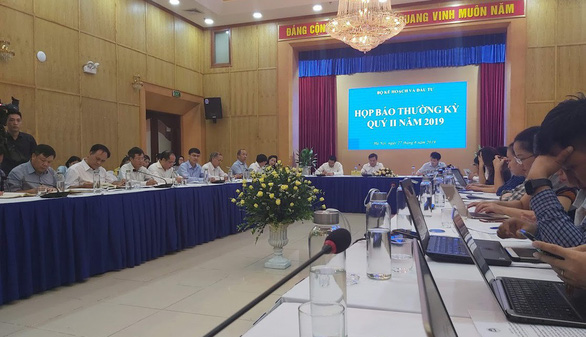Despite concerns that the U.S. may levy tariffs on Vietnam for benefiting from the ongoing U.S.-China trade tension, there is “no chance” such a scenario will become a reality, a Vietnamese economic advisor said at a press conference on Thursday.
One of the criteria that the U.S. typically considers before slapping tariffs on a country is whether that country runs a one-sided intervention in foreign exchange markets, Luong Van Khoi, vice-president of the National Center for Socio-Economic Information and Forecast (NCIF), said at the event in Hanoi.
Vietnam is not capable of such intervention so there is “no chance” it will come under U.S. tariffs in the near future, the NCIF vice-president told the conference.
NCIF is an agency of Vietnam’s Ministry of Planning and Investment in charge of providing analysis and making forecasts on the country’s socio-economic status for policy-making purposes.
The current trade tension between China and the U.S., which started in 2018, should benefit Vietnam in the short term but it will affect the country negatively in the long run due to impacts of a decline in global economic growth, Khoi said.
The Vietnamese government should take measures to stabilize its macro-economy, make flexible adjustments to foreign exchange rates as well as strengthening trade defense measures to prevent transshipment of goods through Vietnam to evade tariffs, he added.
U.S. President Donald Trump flew to the G20 summit on Wednesday sounding warnings that China was “ripe” for new tariffs.
Trump has already imposed levies on US$200 billion of Chinese imports, indicating he was also ready to slap tariffs on all remaining Chinese shipments, worth more than $300 billion.
China was the third-largest source of investments into Vietnam in the first half of 2019, having poured $2.2 billion into its southern neighbor, according to Nguyen Noi, deputy director of Vietnam’s Department of Foreign Investment.
“When the U.S. imposes hefty tariffs [on China], there will be a shift in where investments are going,” Noi told Thursday’s conference.
“We have an advantage in taking in more investment projects, but the downside includes risks of poor-quality projects and trade fraud through manipulating the origin of goods,” he added.
Like us on Facebook or follow us on Twitter to get the latest news about Vietnam!


















































